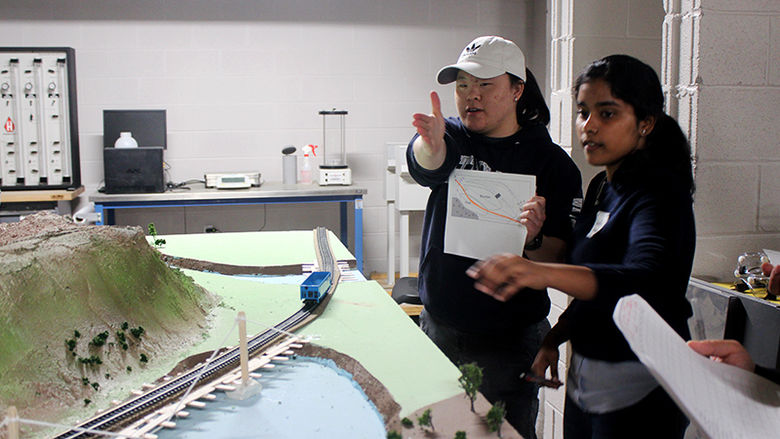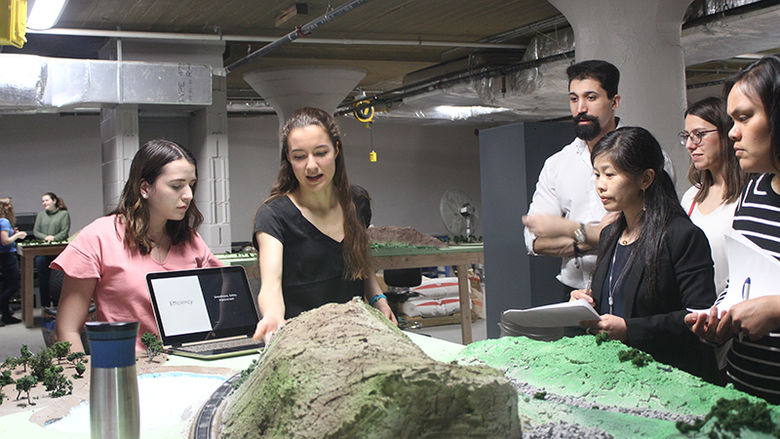Washington, D.C. — Penn State researchers will receive $129 million over the next five years from several federal sources, including the Department of Energy (DOE), and an additional $30 million from Pennsylvania to develop ways to make buildings more energy efficient.
The funds will create an Energy Innovation Hub at the Philadelphia Navy Yard, which will involve a substantial number of researchers from academe, the private sector and two national laboratories in a concerted effort to save energy, cut carbon pollution and position the United States at the forefront of the industry.
The grant, believed to be the largest ever provided to an institution in the Commonwealth and the largest in Penn State's history, will help establish the research center to focus on developing technologies that will make buildings more energy efficient. In addition to the $122 million grant from the DOE, three other federal agencies will provide about $7 million in funding, and Gov. Ed Rendell has pledged $30 million to the project to construct a new facility at the Navy Yard Clean Energy Campus in Philadelphia.
"Buildings consume 40 percent of the energy used in the United States. Finding ways to improve energy efficiency in buildings is the next big frontier in energy research and development. This award places Penn State and our partners at the forefront of this national effort," said Penn State President Graham B. Spanier.
The award is expected to spur real innovation and job growth for Philadelphia, the region and the nation, according to Henry C. Foley, Penn State vice president for Research and the principal investigator for the proposal. "We have a world-class team of universities, corporations and economic development entities that made this proposal come to life. There is no better place to do this work than in the Philadelphia Navy Yard," he said.
The Greater Philadelphia Innovation Cluster (GPIC) includes 11 academic institutions, two DOE laboratories, five high-profile global industry partners, regional economic development agencies, and community colleges. All member organizations will maintain key, full-time personnel at the Navy Yard. It is the culmination of more than a decade of dedicated team effort -- all told, more than 90 organizations have made commitments to help achieve the goals of national energy independence and regional economic development.
Philadelphia's Energy Innovation Hub is one of three Hubs that will receive funding this year from the federal government. The other two hubs focus on nuclear energy and developing fuel from sunlight.
"This is exciting news and is a game changer for the Philadelphia region and for Pennsylvania. We are extremely pleased with the leadership provided by Penn State and the partners that have come together in this effort," said Philadelphia Mayor Michael Nutter.
The 1,200-acre Navy Yard site is a city within a city with a master plan guiding its development. A central feature of the master plan is the Clean Energy Campus aimed at making the Navy Yard and the Greater Philadelphia region a global headquarters for clean energy technology and policy. The Navy Yard's size, its extensive utility infrastructure including an independent electric grid, and diverse building stock, combined with its future development capacity, make it the ideal location for a national energy efficient building initiative.
Penn State engagement at the Navy Yard in Philadelphia has been under way since 2005 as a demonstration of the Engineering Innovation Program of the University. Three other Penn State run Department of Energy Centers already operate at the Navy Yard. These are the Mid-Atlantic Clean Energy Applications Center, the Northern Mid-Atlantic Solar Resource and Training Center and the GridStar Smart Grid Training Center. All of these activities will complement the new Greater Philadelphia Innovation Cluster for Energy Efficient Buildings.
Partners in this Penn State-led energy initiative include: Bayer Material Science; Ben Franklin Technology Partners of Southeast Pennsylvania; Carnegie Mellon University; Collegiate Consortium; Delaware Valley Industrial Resource Center; Drexel University; IBM Corp.; Lawrence Livermore National Laboratory; Morgan State University; New Jersey Institute of Technology; Philadelphia Industrial Development Corporation; PPG Industries; Princeton University; Purdue University; Rutgers University; Turner Construction; United Technologies Corp.; University of Pennsylvania; University of Pittsburgh; Virginia Tech; and Wharton Small Business Development Center.


